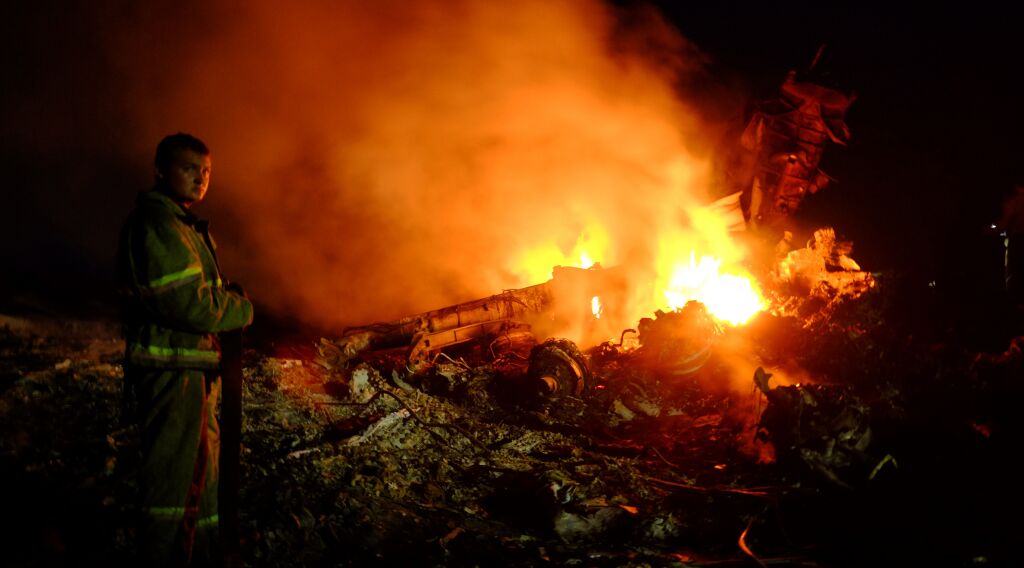
Flight MH17: ‘Europeans Have to Be the Ones to Take the Lead on This’
A Boeing 777 operated by Malaysian Airlines flying from Amsterdam to Kuala Lumpur crashed July 17 near the town of Shakhtyorsk, in the Donetsk region of eastern Ukraine. All 298 people on board died.
Based on the evidence currently available, it seems pro-Russia separatists shot down the plane using the Russian Buk missile system. The separatists appear to have shot down a number of Ukrainian military planes before Flight MH17. It also appears separatists took credit for the shooting online, but deleted those posts once it became clear the plane was a civilian airliner. Ukraine released a recording of what it claims is a phone call between a Russian military intelligence officer and a leader of the pro-Russia separatists, in which the separatists admit to having destroyed the plane. Photos and reports from Western media were just starting to emerge that the separatists had control of a Buk missile launcher shortly before the airliner was shot down.
Alternative explanations seem unlikely. The Russian military could have destroyed the plane, but it had no reason to. Trained Russian operators seem much less likely to shoot down the plane by mistake than the amateur group of separatists.
https://www.youtube.com/watch?v=4u0_8oB-23I&feature=youtu.be
Some of the separatists are arguing that Ukraine, which also uses the Buk missile system, shot MH17 down. That seems even less likely. Ukraine could have mistaken it for a Russian military plane trespassing in Ukrainian territory, but the plane had just crossed hundreds of miles of Ukrainian air space without incident. It’s possible Ukraine destroyed it as a “false flag” operation—deliberately attacking the plane and then blaming the separatists—but that’s a big accusation, with no evidence, and would be a very risky strategy.
For now, evidence indicates inexperienced separatist fighters, thinking the plane was a Ukrainian military transport, shot down the airliner using either a missile system Russia gave them or one they captured from the Ukrainian military.
In short, Russia-backed insurgents shot down a passenger jet.
So what’s next? In 1983, Russia shot down a Korean airliner after it strayed into restricted airspace. America, under then-President Ronald Reagan, delivered a firm response, using the outrage to gain support for stationing Pershing ii cruise missiles in West Germany.
This time, early indications are that America won’t do much. In an interview for America’s Public Broadcasting Service (pbs), talk show host Charlie Rose asked former U.S. Secretary of State Hillary Clinton, “What does the United States do if there is a clear indication … that it was Russian separatists … perhaps using weapons from Russia?”
“I think that the first question is what does Europe do,” Mrs. Clinton replied.
“If there is evidence linking Russia to this, that should inspire the Europeans to do much more,” she added. “Europeans have to be the ones to take the lead on this … there should be outrage in European capitals.” At no point in the interview segment released online did she mention an American response.
Mrs. Clinton is no longer part of the government, but her words undoubtedly reflect the feelings of America’s current leaders. Part of the reason she said Europe needs to lead the response is that it has not been as tough on Russia as America has. This is another example of America’s desire to pass global leadership over to someone else.
And Mrs. Clinton is right—this crash should shake Europe. It could be a trigger for Europe to unify and build its ability to put up some serious opposition to Russia. Even if nothing much happens in the short term, it still increases Europe’s fear of Russia.
“For the first time, the conflict claimed victims who are citizens of Western countries, over half of them Dutch nationals,” Lithuanian Foreign Minister Linas Linkevičius said. “So if before, the conflict was seen as a local one, it has become much broader in scale and can be a breaking point in how everyone sees the situation.”
This is one of the biggest trends to watch for in the ongoing Crimean crisis.
“We have been prophesying for around 70 years that Eastern Europe would become a vital part of a new European superpower—a resurrection of the Holy Roman Empire,” editor in chief Gerald Flurry wrote in the cover article for the May-June issue of the Trumpet. “This prophecy is directly related to the Crimean crisis! The fear you see in Europe because of events in Crimea is going to cause 10 leaders in Europe to unite in a sudden and dramatic way—and in precise accordance with the Bible’s description of that European empire!”
The MH17 shooting will only add to Eastern Europe’s fear and outrage, pushing Europe closer to an eventual, firm response. For more information on how this crisis is changing Europe, read Mr. Flurry’s article “The Crimean Crisis Is Reshaping Europe!”
